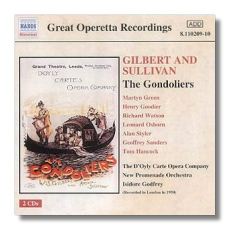
The Internet's Premier Classical Music Source
Related Links
- Latest Reviews
- More Reviews
-
By Composer
-
Collections
DVD & Blu-ray
Books
Concert Reviews
Articles/Interviews
Software
Audio
Search Amazon
Recommended Links
Site News
 CD Review
CD Review
Gilbert & Sullivan

The Gondoliers
- Martyn Green (Duke of Plaza Toro)
- Muriel Harding (Gianetta)
- Yvonne Dean (Tessa)
- Margaret Mitchell (Casilda)
- Leonard Osborn (Marco Palmieri)
- Alan Styler (Giuseppe Palmieri)
- Ella Halman (Duchess of Plaza Toro)
- Richard Watson (Don Alhambra del Boléro)
- Henry Goodier (Luiz)
D'Oyly Carte Opera Company/Isidore Godfrey
Naxos 8.110209-210 ADD monaural 2CDs: 55:07, 34:55
The D'Oyly Carte Opera Company stayed out of the recording studios during World War Two. By the time the war was over, their most recent recordings of Gilbert and Sullivan's operettas were decades old. Furthermore, the writing was on the wall for the 78-rpm record, and Decca saw the artistic and commercial value of having the D'Oyly Cartes – who had premièred G and S's operettas in the previous century – record them for the new medium. A new series of recordings was begun in 1950, and it continued until the middle of that decade. Once this series was completed, new technological improvements were on the horizon, and the D'Oyly Cartes began a new series of G and s recordings in stereo, starting with The Mikado in 1957. The stereo recordings were the first to be reissued on CD, and the pre-World War Two recordings - fondly remembered for the singing of George Baker, among others – were the next. The 1950s recordings have been in limbo: boasting neither modern sound nor superlative sentimental value, they have not appeared on CD until recently.
First Pearl and now Naxos have taken up the cause, and the present set joins Naxos 8.110176-77 (The Mikado) and Naxos 8.110175 (H.M.S. Pinafore) in preserving artifacts from this era in D'Oyly Carte history. Pearl has reissued this same recording on Pearl GEMS 0135 with Ruddigore. For many collectors, the reason for collecting these sets can be expressed in a single name: Martyn Green. Green was his era's master of the roles previously sung by George Baker, and later sung by John Reed. Green's warm baritone voice qualified him to be singer first and an actor second, but, because of his dramatic talents, he managed to give these roles equal priorities. He always created sympathy for his characters, and he understood how effective it was to create a serious moment in an evening of humor, when the occasion presented itself. (It doesn't in The Gondoliers!) His diction, even in the most demanding patter songs, was wonderful. He is the best reason to hear these recordings, even though they are more than a half-century old now.
This Gondoliers dates from March 11, 1950. Apparently it was not unusual at this time to record an entire operetta in a single day, and the results, understandably, were sometimes less than ideally polished. The D'Oyly Cartes had not recorded The Gondoliers since 1927. (There are no overlaps between the 1927 and 1950 casts.) It was recorded without dialogue, as was customary at the time. (If you want the dialogue, you'll have to purchase one of the stereo D'Oyly Carte sets.)
The difficulty with this operetta is that there are three pairs of romantic leads, and filling them evenly and with competent singers strains even the D'Oyly Cartes. Although this 1950 Gondoliers often sounds like a seat-of-the-pants, "one take only" affair, it has many strengths, not least Godfrey's alert conducting. Green is in top form as the Duke, and Alan Styler's warm baritone makes him an attractive Giuseppe, but he was unlucky to draw the hollow-toned Yvonne Dean as Tessa. ("When a merry maiden marries" is not very appealing.) Dean may have been an understudy for another singer, because she doesn't appear in a starring role on any other D'Oyly Carte recording. Muriel Harding sings Gianetta's solos, including "Kind sir, you cannot have the heart," with edgy charm. Margaret Mitchell's Casilda and Richard Watson's Don Alhambra are more than dependable; Ella Hallman's Duchess is less so. (She lazily dilutes her dotted rhythms in "In the day that I was wedded" into triplets.) Leonard Osborn strains and is graceless as Marco. He is a consistent liability in this series of recordings. (I understand that he was easier on the eyes than on the ears.) Henry Goodier, like Dean, is an unfamiliar name, but he is rather more successful with Luiz, and he is the baritone that Sullivan requested. (For some reason, this role is often given to a tenor.) Naxos' transfer (effected by David Lennick) tames the distortion and the pervasive hum that Pearl was unable to remove in its reissue. This is a recording that sounds older than it really is, and my LPs of this performance still give a warmer sound. Naxos is closer to the LP's sound, and so their reissue is clearly preferable to Pearl's.
Pearl's annotations are by Marc Shepherd, whose excellent G and S discography on the Internet is required reading for anyone who has gotten this far in my review! Naxos hardly has any annotations at all, except for a plot synopsis, and some perfunctory bios of a few of the soloists. That's the weakness of this release.
In short, listeners who are new to G and S should choose stereo recordings, preferably those by the D'Oyly Cartes. This recording will appeal to collectors who are confirmed G and S fans, particularly to those who want to hear why Martyn Green was such a beloved Savoyard.
Copyright © 2002, Raymond Tuttle














